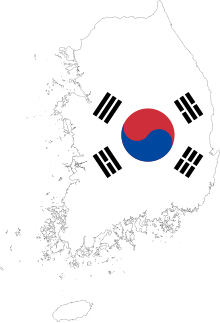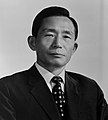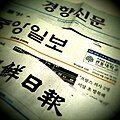Portal:South Korea
 |
환영합니다! / Welcome To The South Korea Portal!  South Korea, officially the Republic of Korea (ROK), is a country in East Asia. It constitutes the southern half of the Korean Peninsula and borders North Korea along the Korean Demilitarized Zone; though it also claims the land border with China and Russia. The country's western border is formed by the Yellow Sea, while its eastern border is defined by the Sea of Japan. South Korea claims to be the sole legitimate government of the entire peninsula and adjacent islands. It has a population of 51.96 million, of which half live in the Seoul Capital Area, the ninth most populous metropolitan area in the world. Other major cities include Busan, Daegu, and Incheon. The Korean Peninsula was inhabited as early as the Lower Paleolithic period. Its first kingdom was noted in Chinese records in the early 7th century BCE. After the unification of the Three Kingdoms of Korea into Silla and Balhae in the late 7th century, Korea was ruled by the Goryeo dynasty (918–1392) and the Joseon dynasty (1392–1897). The succeeding Korean Empire (1897–1910) was annexed in 1910 into the Empire of Japan. Japanese rule ended following Japan's surrender in World War II, after which Korea was divided into two zones: a northern zone, which was occupied by the Soviet Union, and a southern zone, which was occupied by the United States. After negotiations on reunification failed, the southern zone became the Republic of Korea in August 1948, while the northern zone became the communist Democratic People's Republic of Korea the following month. In 1950, a North Korean invasion began the Korean War, which ended in 1953 after extensive fighting involving the American-led United Nations Command and the People's Volunteer Army from China with Soviet assistance. The war left 3 million Koreans dead and the economy in ruins. The authoritarian First Republic of Korea led by Syngman Rhee was overthrown in the April Revolution of 1960. However, the Second Republic failed to control the revolutionary fervor. The May 16 coup of 1961 led by Park Chung Hee put an end to the Second Republic, signaling the start of the Third Republic in 1963. South Korea's devastated economy began to soar under Park's leadership, recording one of the fastest rises in average GDP per capita. Despite lacking natural resources, the nation rapidly developed to become one of the Four Asian Tigers based on international trade and economic globalization, integrating itself within the world economy with export-oriented industrialization. The Fourth Republic was established after the October Restoration of 1972, in which Park wielded absolute power. The Yushin Constitution declared that the president could suspend basic human rights and appoint a third of the parliament. Suppression of the opposition and human rights abuse by the government became more severe in this period. Even after Park's assassination in 1979, the authoritarian rule continued in the Fifth Republic led by Chun Doo-hwan, which violently seized power by two coups and brutally suppressed the Gwangju Uprising. The June Democratic Struggle of 1987 ended authoritarian rule, forming the current Sixth Republic. The country is now considered among the most advanced democracies in continental and East Asia. (Full article...) Selected article -Seoul, officially Seoul Special Metropolitan City, is the capital and largest city of South Korea. The broader Seoul Capital Area, encompassing Gyeonggi Province and Incheon, emerged as the world's sixth largest metropolitan economy in 2022, trailing behind Paris, San Francisco, Los Angeles, Tokyo, and New York, and hosts more than half of South Korea's population. Although Seoul's population peaked at over 10 million, it has gradually decreased since 2014, standing at about 9.6 million residents as of 2024. Seoul is the seat of the South Korean government. Seoul's history traces back to 18 BC when it was founded by the people of Baekje, one of the Three Kingdoms of Korea. During the Joseon dynasty, Seoul was officially designated as the capital, surrounded by the Fortress Wall of Seoul. In the early 20th century, Seoul was occupied by the Japanese Empire, temporarily renamed "Keijō" ("Gyeongseong" in Korean). The Korean War brought fierce battles, with Seoul changing hands four times and leaving the city mostly in ruins. Nevertheless, the city has since undergone significant reconstruction and rapid urbanization. Seoul was rated Asia's most livable city, with the second-highest quality of life globally according to Arcadis in 2015 and a GDP per capita (PPP) of approximately $40,000. 15 Fortune Global 500 companies, including industry giants such as Samsung, LG, and Hyundai, are headquartered in the Seoul Capital Area, which has major technology hubs, such as Gangnam and Digital Media City. Seoul is ranked seventh in the Global Power City Index and the Global Financial Centres Index, and is one of the five leading hosts of global conferences. The city has also hosted major events such as the 1986 Asian Games, the 1988 Summer Olympics, and the 2010 G20 Seoul summit, in addition to three matches at the 2002 FIFA World Cup. (Full article...) Selected image Girls' Generation (Korean: 소녀시대; RR: Sonyeo Sidae), also known as SNSD, is a South Korean girl group formed by SM Entertainment. Its nine original members were (pictured, from left to right): Taeyeon, Hyoyeon, Seohyun, Sooyoung, Yoona, Jessica, Tiffany, Sunny, and Yuri. Jessica later departed from the group in September 2014. More did you know -
In the news
This is a Good article, an article that meets a core set of high editorial standards.
Jay Park (Korean name: Park Jae-beom (Korean: 박재범); born April 25, 1987) is an American rapper, singer-songwriter and dancer based in South Korea. He is a member of the Seattle-based b-boy crew Art of Movement (AOM), and founder and former CEO of the independent hip hop record labels AOMG and H1ghr Music, as well as the founder of the record label More Vision. Park returned to South Korea in June 2010 for the filming of Hype Nation, and in July, Park signed a contract with SidusHQ, one of the largest entertainment agencies in South Korea. Rebranding and re-debuting as both a solo singer and a rapper, Park has participated in the underground hip hop culture scene in South Korea, a rarity for both active and former K-Pop idols. Known for his charismatic performances and stage presence, Park has been described as a "born entertainer" by Korean pop singer Patti Kim, and The New York Times quoted the president of digital music distributor DFSB Kollective illustrating Park as "not just an artist, but also his own PR agent, fan club president, and TV network." An influential figure in the Korean hip hop scene, Park has been described as the "scene stalwart" of Korean R&B, and has been credited as one of the main figures responsible for the increased commercial acceptance and mainstream popularization of K-hip hop in South Korea. (Full article...) General images -The following are images from various South Korea-related articles on Wikipedia.
Did you know (auto-generated)
WikiProjectsSee WikiProject Korea for collaborating on South Korea topics, and more broadly, on all things Korea-related. South Korea topics
CategoriesAdministrative divisions of South Korea
Related portalsEast Asia Associated WikimediaThe following Wikimedia Foundation sister projects provide more on this subject:
Web resources
SourcesDiscover Wikipedia using portals |

























































